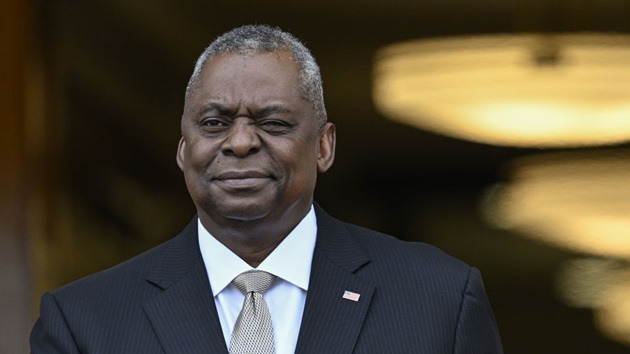(WASHINGTON) — The U.S. is responding to the escalating crisis in the Red Sea by announcing Tuesday it has launched an international task force for maritime security, but so far only nine other politically similar nations are confirmed to have joined on — sparking doubt that the coalition can put an end to militia attacks on vessels in the region and calm anxious shipping companies.
State Department officials said the Biden administration’s initial goal was to bring together a broad array of international powers to rein in the Houthis, an armed group backed by Iran that controls a significant amount of territory in Yemen.
However, when Defense Secretary Lloyd Austin announced the initiative, dubbed Operation Prosperity Guardian, the U.S. said it had only managed to recruit the United Kingdom, Bahrain, Canada, France, Italy, Netherlands, Norway, Seychelles and Spain — seven NATO allies and two small island nations.
Asked about whether the coalition could have a meaningful impact, White House spokesperson John Kirby said on Tuesday that time would tell.
“There’s going to be a whole lot of hardware in the Red Sea now, naval hardware, not just from the United States, but other ships from other nations to counter these threats,” he said. “So let’s see where it goes.”
Although a State Department official said that the U.S. has sent multiple messages to the Houthis via various diplomatic channels warning them against continuing their indiscriminate attacks, those threats appear to have had little impact, as the Houthis continue to insist they will stop only when Israel’s war in Gaza ends.
That link between the conflict and the Houthis’ own provocations appears to have had significant sway over Arab countries where public sympathy for the Palestinian people’s plight often influences political decisions.
Even though the Middle East depends heavily on the impacted trade routes, Bahrain is the sole nation in the region taking part in the task force, and it’s still unclear whether it will go so far as to support the mission by supplying manpower or ships.
Saudi Arabia, a country that led its own coalition to launch an intervention in Yemen — battling the Houthis by land, air and sea in recent years — would typically be seen as a likely candidate to join the task force. Although the country has been involved in Yemeni peace talks run by the United Nations, the Houthis have sporadically targeted Saudi holdings and are viewed as a threat to Crown Prince Mohammed bin Salman’s goal to transform the country into a tourist destination by 2030.
Now, even high-level attempts to court Riyadh have so far proven unsuccessful. Secretary of State Antony Blinken held a call with his Saudi counterpart on Monday during which, according to a readout of the conversation, he urged “cooperation among all partners to uphold maritime security.” A readout of the same call from Saudi Arabia’s foreign ministry made no mention of the topic.
Oman, which maintains relationships with Houthi leaders and has proven to hold significant influence over the group in the past, is another notable absence.
Outside of the Middle East, U.S. officials have courted China for the mission. Even though the Red Sea is of critical geostrategic and economic importance to Beijing, the Biden administration’s weekslong campaign to push the country to use its influence to promote maritime security seems to have fallen flat.
State Department spokesperson Matthew Miller said on Tuesday that the coalition remained open to new members, adding that “every country in the world can be doing more.”
“It is in the interest of everyone in the region and everyone in the world to deter these attacks and to respond to them,” Miller said. “Our collective efforts remain open for additional countries to join in the crucial mission of defending the free flow of commerce in the Red Sea.”
Major shipping companies have expressed anxiety about operating in the region, and a number of major players have altered some of their vessels’ routes or suspended operations altogether.
Since October, the Houthis have launched over 100 attacks targeting at least 10 merchant vessels, according to the Pentagon. The militia also seized the Galaxy Leader, a Japanese-chartered vehicle carrier bearing the Bahamian flag, and is still holding the ship and its 25-person crew captive.
While U.S. Navy destroyers have downed Houthi drones and missiles in the Red Sea, the Biden administration — wary of the conflict between Israel and Hamas escalating into a regional war — has shown little interest in launching a more drastic military intervention.
ABC’s Luis Martinez, Matthew Seyler and Cheyenne Haslett contributed to this report.
Copyright © 2023, ABC Audio. All rights reserved.












